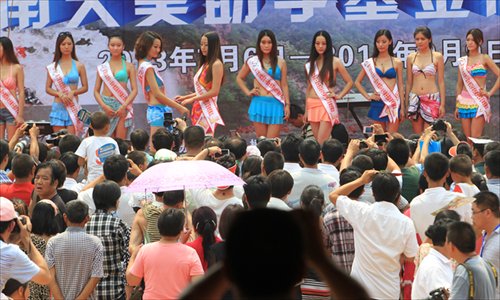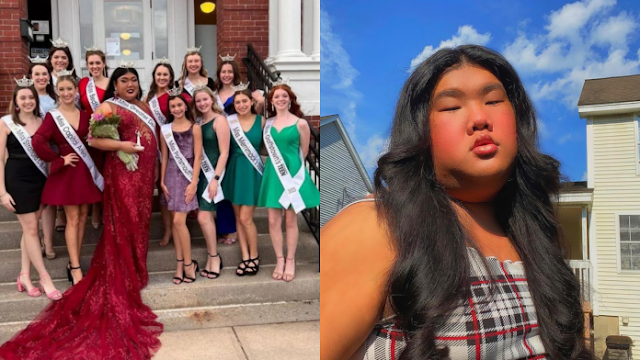Corruption, over-crowding choking off life to pageants in China

Contestants of Miss Tourism Queen International appear on July 6 at an auction event in Ruyang, Henan Province, where tourists bid for a chance to go rafting with the beauties. Photo: CFP

A contestant shares a hot dance with a judge at a Miss Bikini Global event in Wuhan, Hubei Province on July 13. Photo: CFP
As the Chinese final of the 2013 Miss Tourism Queen International pageant came to a close in Wuhan, the capital of Central China's Hubei Province, Zhang Feng, the contest's chairman, was in no mood to celebrate.
"I wanted to end my 10-year job as a beauty pageant organizer after this contest," said 40-year-old Zhang, one of the driving forces behind the beauty pageant industry on the Chinese mainland. Zhang felt he could no longer continue to work in the field due to a raft of hidden rules that forced him to compromise his principles.
Zhang's frustration and disappointment with the beauty pageant industry in China is shared by many who have quit the sector.
No money, no honey
Problems started cropping up on May 7, when the finale was half done. Zhang had to deal with the competition's sponsors who were unhappy with what they saw as limited media coverage. He became worried that they might refuse to pay the final sponsorship fee of 1 million yuan ($162,900). That would mean that all his efforts would be in vain given that the competition, costing more than 3 million yuan, would be jeopardized without a complete finale.
It has been a headache for beauty pageant managers like Zhang to manage sponsors' high expectations for media coverage and advertisements.
The interest in beauty pageants has dwindled in the media, which often avoid mentioning the names of sponsors unless they are paid to do so.
"It's common for a beauty pageant to become a game with sponsors, organizers, and media battling and trying to gain something from one another," said a industry insider. "Their negotiations and the cost of media coverage have prevented the industry from developing."
Zhang, from Zhejiang Province, used to work as a fashion designer before he entered the beauty pageant business. Back in 2003 he saw several world-famous beauty contests were selling their overseas rights, including Miss World for $1 million and Miss Universe for $6 million. Zhang spent $500,000, some 4 million yuan at the time, to buy up the Asia rights for Miss Tourism Queen International.
During the first Miss Tourism Queen International competition in China held between 2004 and 2005, Zhang witnessed how difficult it was to seek sponsorship.
At the time, the Hangzhou municipal government expressed interest in hosting the event but asked the organizing committee to find money and sponsorship by themselves. In October 2004 the event was launched at the Great Hall of the People in Beijing, with its activities being held in Xitang, Zhejiang while Hangzhou hosted the finale.
The event itself was a huge success and helped Xitang, a small town in East China, get on the map. However, the success of the competition did not mean a windfall for Zhang, who had to sell his car to meet the operational cost of the organizing committee.
Hidden deals and competition
What Zhang found even more depressing was that hidden rules and under-the-table deals were quickly used to choose a winner in almost all pageants.
One contestant's mother approached Zhang in Hangzhou in 2006 and said she would put up 3 million yuan in sponsorship fees if he could make sure her daughter won the competition. Zhang said he might consider giving her an individual award but that it was impossible to make her the winner of the whole thing. The mother then asked him to name his price. Zhang replied, "Bring me 25 million yuan and I'll sell the competition's rights to you, and you can pick the winner."
It was already an open secret back then that trading for the winner's title was common at beauty pageants on the mainland, and that it could cost some 500,000 yuan to name a winner at even a local beauty contest. But the buy-offs were usually hidden as sponsorship to try and hide some of the illicit activities.
Although the annual Miss Tourism Queen International seemed to be doing great in China, Zhang felt exhausted as well as being under great financial pressure. He had to sell his apartment in 2006 after the event was hosted in Heyuan, Guangdong. Difficulties in finding sponsorships and collecting funds have discouraged many organizers of beauty pageants, including Zhang.
Although the beauty pageant industry is fading, it once blazed with glory from the late 1990s until 2005.
"Different pageants were held every day, for example in Chengdu there could be as many as seven contests in a single day," said Ye Jian, a veteran beauty competition insider. But he said that the level of the contestants remained high despite the plethora of events.
The beauty contest craze went on for about five years. Just as insiders have noted, it was filled with copycats as long as it proved to be profitable but it was that crowded market that contributed to its inevitable buckling. Many competitions were organized by people who registered a company in Hong Kong or abroad with the express purpose of starting an "international" pageant here.
This drew the attention of the big boys. In recent years many high-level international beauty pageants have been held in China, including Miss World, Miss Universe, and Miss Bikini International. Hong Kong has its Miss Hong Kong, while the mainland has a few popular contests still holding on, such as the New Silk Road model contest. Meanwhile, local TV stations also host their own competitions to boost ratings, but the interest for these seems to be flagging.
But not all the competitions were so credentialed. Many host cities were tricked by competition organizers without really knowing where the competition came from and who the organizers were. For example, two beauty pageants in Chengdu got into a spat last year while seeking governmental support and sponsors, accusing each other of being copycat.
Insiders say it has become obvious that the success of a beauty competition is no longer based on its brand or influence, but on whether it gets enough sponsorship money.
Rules revealed
One example of hidden rules being caught by the media was provided when Wang Kui, a restaurant owner in Chengdu, married Tao Siyuan, winner of a Miss Universe China competition in 2007. Their marriage shocked Chinese beauty industry and darkened the reputation of beauty contests as Wang was a major sponsor of the Miss Universe event in which Tao participated.
Unspoken rules within the industry have become ever more obvious, dimming people's interest in beauty queens. Now that the glory days are over, according to industry insiders, it only costs around 200,000 yuan to manipulate the results and secure a winner in one of China's most popular beauty contests. Some 50,000 yuan is enough for less influential events.
It is a crime to manipulate results of competitions on such a large scale in the US and European countries, where the market is better regulated, but in the mainland many people simply turn a blind eye to these half-open trades.
"I wonder how far the industry can go in China if everyone thinks it's OK to ruin its credibility at will," Zhang Feng said.
As the industry seems to be going down, the beauty contestants are not having any better luck.
There are far too many beauty queens for there to be long-term opportunities for them all, which means most of them return to their normal lives after failing to make it. They might get a few contracts and cooperate with some agencies in the first year or two after their coronations. But apart from these odd advertising campaigns, jobs are few and far between and salaries are low.
The contests have become less appealing for women as well, due to a less promising future, and the tainted image of these pageants. Several beauty pageants in China have been slammed for choosing winners that seem far less charismatic or beautiful than other contestants, while others have drafted in professional models to make up for a lack of contestants.
"There is not a single fashion brand in China that is competitive on the international market, and China doesn't need so many models after all," said one beauty pageant judge, speaking under condition of anonymity.
"It's awkward to see so many beauty contests where we don't have a mature commercial environment to make and package the winners," the judge said.
SOURCE: Globaltimes.cn, July 15, 2013


Comments
Post a Comment